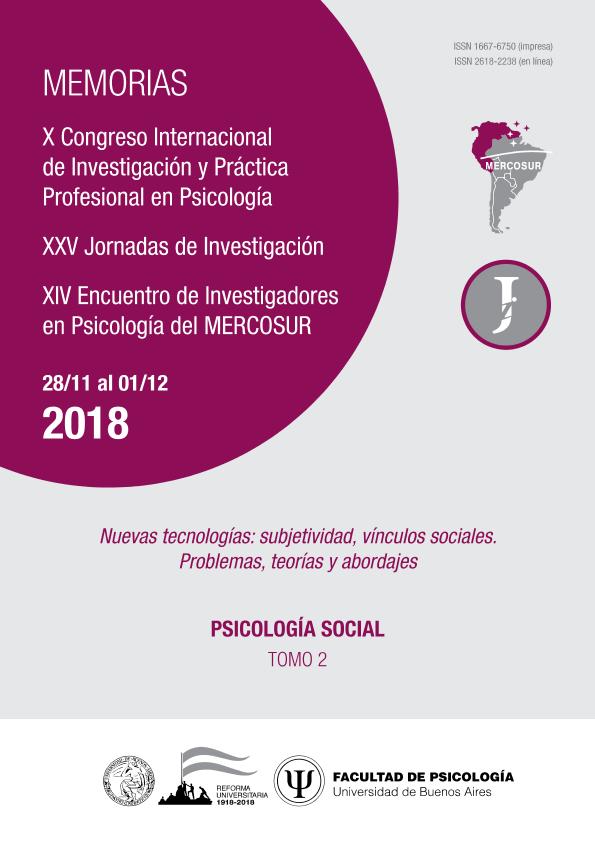Mostrar el registro sencillo del ítem
dc.contributor.author
Bria, María Paula

dc.contributor.author
Vodovotz, Gabriel
dc.contributor.author
Jaume, Luis Carlos

dc.contributor.author
Etchezahar, Edgardo Daniel

dc.date.available
2024-04-04T12:19:36Z
dc.date.issued
2018
dc.identifier.citation
Elección de pareja según del sexismo ambivalente; X Congreso Internacional de Investigación y Práctica Profesional en Psicología; XXV Jornadas de Investigación; XIV Encuentro de Investigadores en Psicología del MERCOSUR; Ciudad Autónoma de Buenos Aires; Argentina; 2018; 108-108
dc.identifier.issn
1667-6750
dc.identifier.uri
http://hdl.handle.net/11336/231888
dc.description.abstract
La literatura científica sobre la elección de parejas ha indicado que los individuos, suelen tener en cuenta una serie de características específicas, que se fundamentan en creencias sobre los roles circunscriptos para ambos sexos. En este sentido, Fletcher & Simpson (2000) han propuesto tres dimensiones correspondientes al tipo ideal de pareja: calidez-lealtad, vitalidad-atractivo físico y estatus recursos económicos. Además, diferentes autores han sugerido que dichas preferencias podrían estar influenciadas por los niveles de sexismo de los individuos (Glick & Fiske, 1996, 2001). El objetivo principal de este trabajo fue analizar las relaciones entre el sexismo hostil y benevolente con las preferencias en la elección de pareja. Participaron del estudio 325 adultos con edades entre 18 y 64 años (69% mujeres). Se evaluó el sexismo a través del Inventario de Sexismo Ambivalente, mientras que para las preferencias de pareja se utilizó la Escala de Pareja Ideal. Los resultados indicaron relaciones positivas entre el sexismo benevolente y la preferencia por una pareja cálida y de confianza, así como también entre el sexismo hostil y la preferencia por parejas atractivas y vitales. Se discute la importancia de las creencias sexistas en la relación entre los sexos a la hora de la elección de pareja.
dc.description.abstract
The scientific literature on the choice of couples has indicated that individuals, when making their choices, tend to take into account a number of characteristics, which are based on beliefs about roles circumscribed for both sexes. In this sense, Fletcher & Simpson (2000) have proposed the existence of three dimensions corresponding to the ideal type of couple: warmth-loyalty, vitality-physical attractiveness and status-economic resources. In addition, different authors have suggested that these preferences could be influenced by the levels of sexism of individuals (Glick & Fiske, 1996, 2001). The main objective of this work was to analyze the relations between hostile and benevolent sexism with preferences in the choice of couple. Participating in the study were 325 adults with a range between 18 and 64 years (69% women). Sexism was evaluated through the Inventory of Ambivalent Sexism, while the Ideal Couple Scale was used for couple preferences. The results indicated positive relationships between benevolent sexism and the preference for a warm and trusting couple, as well as between hostile sexism and preference for attractive and vital partners. The importance of sexist beliefs in the relationship between the sexes at the time of the choice of couple is discussed.
dc.format
application/pdf
dc.language.iso
spa
dc.publisher
Universidad de Buenos Aires. Facultad de Psicología
dc.rights
info:eu-repo/semantics/openAccess
dc.rights.uri
https://creativecommons.org/licenses/by-nc-sa/2.5/ar/
dc.subject
Sexismo Ambivalente
dc.subject
Sexismo Hostil
dc.subject
Sexismo Benevolente
dc.subject
Elección de pareja
dc.subject.classification
Otras Psicología

dc.subject.classification
Psicología

dc.subject.classification
CIENCIAS SOCIALES

dc.title
Elección de pareja según del sexismo ambivalente
dc.title
Couple's choice and ambivalent sexism
dc.type
info:eu-repo/semantics/publishedVersion
dc.type
info:eu-repo/semantics/conferenceObject
dc.type
info:ar-repo/semantics/documento de conferencia
dc.date.updated
2024-02-28T15:02:38Z
dc.identifier.eissn
2618-2238
dc.journal.pagination
108-108
dc.journal.pais
Argentina

dc.journal.ciudad
Ciudad Autónoma de Buenos Aires
dc.description.fil
Fil: Bria, María Paula. Universidad de Buenos Aires; Argentina
dc.description.fil
Fil: Vodovotz, Gabriel. Universidad de Buenos Aires; Argentina
dc.description.fil
Fil: Jaume, Luis Carlos. Consejo Nacional de Investigaciones Científicas y Técnicas; Argentina
dc.description.fil
Fil: Etchezahar, Edgardo Daniel. Consejo Nacional de Investigaciones Científicas y Técnicas. Oficina de Coordinación Administrativa Saavedra 15. Centro Interdisciplinario de Investigaciones en Psicología Matemática y Experimental Dr. Horacio J. A. Rimoldi; Argentina
dc.relation.alternativeid
info:eu-repo/semantics/altIdentifier/url/http://jimemorias.psi.uba.ar/index.aspx?anio=2018
dc.conicet.rol
Autor

dc.conicet.rol
Autor

dc.conicet.rol
Autor

dc.conicet.rol
Autor

dc.coverage
Internacional
dc.type.subtype
Congreso
dc.description.nombreEvento
X Congreso Internacional de Investigación y Práctica Profesional en Psicología; XXV Jornadas de Investigación; XIV Encuentro de Investigadores en Psicología del MERCOSUR
dc.date.evento
2018-11-28
dc.description.ciudadEvento
Ciudad Autónoma de Buenos Aires
dc.description.paisEvento
Argentina

dc.type.publicacion
Journal
dc.description.institucionOrganizadora
Universidad de Buenos Aires. Facultad de Psicología
dc.source.revista
Memorias Jornadas de Investigación y Encuentro de Investigadores en Psicología del Mercosur
dc.date.eventoHasta
2018-12-01
dc.type
Congreso
Archivos asociados
